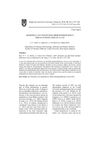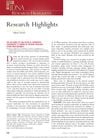 15 citations,
December 2020 in “Pharmacology Research & Perspectives”
15 citations,
December 2020 in “Pharmacology Research & Perspectives” Blocking enzymes that help the virus enter cells could be a promising way to treat COVID-19.
 56 citations,
April 2015 in “American journal of medical genetics. Part A”
56 citations,
April 2015 in “American journal of medical genetics. Part A” Patients with Bohring-Opitz syndrome and ASXL1 mutations need regular kidney ultrasounds to check for tumors.
 December 2023 in “Journal of Ayub Medical College Abbottabad”
December 2023 in “Journal of Ayub Medical College Abbottabad” Ritlecitinib effectively treats alopecia areata in patients 12 and older with fewer side effects.
69 citations,
April 2010 in “Clinical ophthalmology” Bimatoprost is effective for growing longer, thicker, and darker eyelashes.
 9 citations,
July 1995 in “Veterinary Clinics of North America: Small Animal Practice”
9 citations,
July 1995 in “Veterinary Clinics of North America: Small Animal Practice” The document concludes that hair loss in cats is caused by various factors, including allergies, mites, infections, and hormonal issues, with treatments varying accordingly.
 67 citations,
January 2020 in “Cellular & Molecular Immunology/Cellular & molecular immunology”
67 citations,
January 2020 in “Cellular & Molecular Immunology/Cellular & molecular immunology” Tissue-resident memory T cells can protect against infections and cancer but may also contribute to autoimmune diseases.
 3 citations,
January 2019 in “Bulgarian Journal of Veterinary Medicine”
3 citations,
January 2019 in “Bulgarian Journal of Veterinary Medicine” The cat was put to sleep due to recurring infections.
 July 2011 in “Journal of the Dermatology Nurses’ Association”
July 2011 in “Journal of the Dermatology Nurses’ Association” Antibiotic ointment and petrolatum ointment heal wounds similarly; iron deficiency isn't linked to certain hair loss in women; griseofulvin and terbinafine are equally effective for fungal scalp infections but work better on different types.
 247 citations,
August 2011 in “European Journal of Epidemiology”
247 citations,
August 2011 in “European Journal of Epidemiology” The Rotterdam Study updated its design and objectives in 2012, providing insights into various diseases in the elderly, including skin cancer, bone health, liver disease, neurological and psychiatric conditions, and respiratory issues.
 January 2024 in “American journal of clinical dermatology”
January 2024 in “American journal of clinical dermatology” Ritlecitinib is safe and well-tolerated for treating alopecia areata in patients aged 12 and older.
 148 citations,
December 2018 in “Journal of autoimmunity”
148 citations,
December 2018 in “Journal of autoimmunity” Alopecia areata is an autoimmune disease causing patchy hair loss, often with other autoimmune disorders, but its exact causes are unknown.
 1 citations,
January 2013 in “Springer eBooks”
1 citations,
January 2013 in “Springer eBooks” The document concludes that skin and nail changes can indicate various underlying health conditions.
 222 citations,
September 2016 in “JCI insight”
222 citations,
September 2016 in “JCI insight” Tofacitinib is safe and effective for severe alopecia areata, but hair loss may return 2 months after stopping treatment.
 42 citations,
January 2019 in “Frontiers in Immunology”
42 citations,
January 2019 in “Frontiers in Immunology” A blood pressure drug, diltiazem, may also help treat influenza.
 39 citations,
October 2015 in “Case Reports”
39 citations,
October 2015 in “Case Reports” Some people experience severe, long-lasting side effects from fluoroquinolone antibiotics, leading to the recommendation of limited use and increased awareness of these risks.
 336 citations,
August 2015 in “European Journal of Epidemiology”
336 citations,
August 2015 in “European Journal of Epidemiology” The Rotterdam Study found risk factors for elderly diseases, links between lifestyle and genetics with health conditions, and aimed to explore new areas like DNA methylation and sensory input effects on brain function.
 10 citations,
June 2021 in “BioMed Research International”
10 citations,
June 2021 in “BioMed Research International” Some recovered COVID-19 patients experience skin, hair, and nail issues, suggesting they need follow-up care.
 353 citations,
February 2022 in “Nature Immunology”
353 citations,
February 2022 in “Nature Immunology” Long-haul COVID can cause lasting symptoms affecting many body systems and may be linked to ongoing inflammation and immune system issues.
 1 citations,
May 2022 in “IntechOpen eBooks”
1 citations,
May 2022 in “IntechOpen eBooks” Obesity leads to physical, metabolic, reproductive issues, higher healthcare costs, and mental health problems.
 May 2023 in “International Journal of Trichology”
May 2023 in “International Journal of Trichology” Tofacitinib effectively treated severe hair loss in a patient who didn't respond to other treatments.
 30 citations,
June 2016 in “Journal of Human Genetics”
30 citations,
June 2016 in “Journal of Human Genetics” Researchers found genetic mutations causing hypohidrotic ectodermal dysplasia in 88% of studied patients and identified new mutations and genetic variations affecting the disease.
 34 citations,
September 2020 in “BMC Endocrine Disorders”
34 citations,
September 2020 in “BMC Endocrine Disorders” Existing drug dexamethasone may lower death risk in severe COVID-19 cases; more research needed for other drugs.
 3 citations,
July 2017 in “Elsevier eBooks”
3 citations,
July 2017 in “Elsevier eBooks” Skin reactions are a common reason for emergency visits due to drug allergies, with some severe cases needing intensive care.

Icosapent ethyl may help treat long-lasting symptoms after COVID-19.
 77 citations,
July 2020 in “European Journal of Clinical Pharmacology”
77 citations,
July 2020 in “European Journal of Clinical Pharmacology” Blocking the virus's entry into cells by targeting certain pathways could lead to early COVID-19 treatments.
 4 citations,
April 2021 in “Experimental and Molecular Medicine”
4 citations,
April 2021 in “Experimental and Molecular Medicine” The conclusion is that certain genetic factors and blood types may affect COVID-19 severity, but changes in ACE2 and TMPRSS2 genes are not clearly linked to it.
 266 citations,
November 2013 in “European Journal of Epidemiology”
266 citations,
November 2013 in “European Journal of Epidemiology” The Rotterdam Study aims to understand disease causes in the elderly and has found new risk factors and genetic influences on various conditions.
 129 citations,
November 2005 in “Internal Medicine Journal”
129 citations,
November 2005 in “Internal Medicine Journal” Early detection and intensive treatment of diseases caused by Staphylococcus aureus toxins are crucial for reducing severe health effects.
 57 citations,
April 2019 in “British journal of dermatology/British journal of dermatology, Supplement”
57 citations,
April 2019 in “British journal of dermatology/British journal of dermatology, Supplement” Alopecia areata involves immune system imbalances that may lead to depression and anxiety.
 18 citations,
September 2020 in “BMC Public Health”
18 citations,
September 2020 in “BMC Public Health” Non-Kuwaiti COVID-19 patients had worse health outcomes than Kuwaitis, likely due to poorer socioeconomic conditions.





























